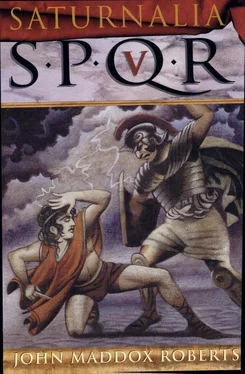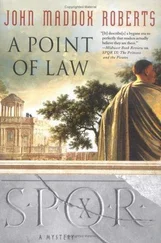John Roberts - Saturnalia
Здесь есть возможность читать онлайн «John Roberts - Saturnalia» весь текст электронной книги совершенно бесплатно (целиком полную версию без сокращений). В некоторых случаях можно слушать аудио, скачать через торрент в формате fb2 и присутствует краткое содержание. Год выпуска: 0101, ISBN: 0101, Издательство: St. Martin, Жанр: Исторический детектив, на английском языке. Описание произведения, (предисловие) а так же отзывы посетителей доступны на портале библиотеки ЛибКат.
- Название:Saturnalia
- Автор:
- Издательство:St. Martin
- Жанр:
- Год:0101
- ISBN:9780312320188
- Рейтинг книги:4 / 5. Голосов: 1
-
Избранное:Добавить в избранное
- Отзывы:
-
Ваша оценка:
- 80
- 1
- 2
- 3
- 4
- 5
Saturnalia: краткое содержание, описание и аннотация
Предлагаем к чтению аннотацию, описание, краткое содержание или предисловие (зависит от того, что написал сам автор книги «Saturnalia»). Если вы не нашли необходимую информацию о книге — напишите в комментариях, мы постараемся отыскать её.
Saturnalia — читать онлайн бесплатно полную книгу (весь текст) целиком
Ниже представлен текст книги, разбитый по страницам. Система сохранения места последней прочитанной страницы, позволяет с удобством читать онлайн бесплатно книгу «Saturnalia», без необходимости каждый раз заново искать на чём Вы остановились. Поставьте закладку, и сможете в любой момент перейти на страницу, на которой закончили чтение.
Интервал:
Закладка:
“Where are they now?” I asked.
“They’ve pitched their tents out on the Campus Martius by the Circus Flaminius. I thought you were one of those people who don’t believe in omens. What do you want with a fortune-teller?”
“It always pays to be careful,” I told him. Bestia was one man with whom I definitely did not wish to discuss an investigation.
“Well, that’s where you’ll find them. Come on, admit it: You’ve got some well-born lady pregnant and you need to arrange for an abortion.”
“You’ve guessed it. Caesar’s wife.”
He hooted. “And she’s supposed to be above suspicion!” After four years Romans still found Caesar’s incredibly pompous and hypocritical pronouncement hilarious. We were laughing less and less at Caesar though.
I thanked him and left. Bestia had been neck deep in Catilina’s crackpot conspiracy and had almost certainly been involved in murder. He’d gotten away clean, though, because he’d been acting as Pompey’s spy within the movement. There was little use in striking a pose of moral superiority. It was all but impossible to accomplish anything in Roman public life without having to deal with odious men like Bestia. He wasn’t even among the worst of them.
It was a long walk out to the Circus Flaminius, but who minds walking after days at sea and on horseback? I left the City proper through the Porta Carmentalis near the southern base of the Capitol. This is the spot where the Servian Wall has two gates within a few paces of each other, but only one of them could be used because the other was opened only for triumphal processions.
I wasn’t looking for any fortune-teller in particular, but I needed to test the atmosphere of a world that was almost entirely unknown to me: the strange underworld of the witches.
Italian witches came in three sorts that I knew about. There was the saga, or wise woman, who was usually a fortuneteller and learned in herb lore and occult matters. They were seldom perceived as malevolent and the authorities periodically drove them from the City only because they sometimes predicted political events and the deaths of important men. These predictions could easily come true, considering how superstitious the citizenry were, and how heavily Rome relied on rumors for information.
Next there was the striga, a true witch or sorceress. These women were known to cast spells, lay curses, and use the bodies of the dead for unclean rites. They were much feared and their activities were strictly forbidden by law.
Last of all was the venefica previously mentioned: the poisoner. I did not plan to go looking for one of those just yet. And, for obvious reasons, they did not publicly cry their wares like ordinary vendors.
The Campus Martius had once been the assembly and drill field for the City’s legions, but its open spaces were getting fewer as buildings encroached. Once the only really large structure there had been the Circus Flaminius, but everything was now dominated by the huge Theater of Pompey and its extensive complex, which included a meeting hall for the Senate. Since its completion, most Senate meetings had been held there. At least the place had enough room. Sulla had almost doubled the number of senators without building a correspondingly large Senate chamber. Now, twenty years later, despite deaths and purgings by the censors, there were still far too many to fit comfortably in the old Curia.
I saw the tents and booths immediately upon coming in sight of the Circus Flaminius. They were brightly colored and painted in fanciful designs with stars, serpents, and lunar crescents being favored motifs. They also seemed to be doing a brisk business, another sign of unsettled times. As in so many other matters, Rome had two distinct traditions in fortune-telling: the official and the popular.
On an official level, the state had augurs who were elected and who interpreted omens according to a strict table of significance, mostly concerned with birds, lightning, thunder, and other things of the air. They did not foretell the future, but rather, they received the will of the gods concerning a given subject at a particular time. This was a bit rarified for the common people, so from time to time the state resorted to the Etruscan haruspices, who interpreted the will of the gods by the robust technique of examining the entrails of sacrificial animals. Rarest of all were consultations of the Sibylline Books, which occurred only at times of calamity or extraordinary omens and were in the keeping of a college of fifteen distinguished men.
These were lofty personages, whose pronouncements were of general concern to the state and community. There were private augurs and haruspices who offered personal consultations and charged a fee for their services, but they were rather despised by officialdom. Hence the wise women, whom the common people consulted incessantly upon matters both important and trivial. Unlike the official omen readers, who made no pretence to special powers, the seeresses often claimed the ability to foresee the future. Like their betters, the commons never lacked for credulity, and the frequency of failed predictions never shook their faith in the efficacy of these prophetesses.
The first booth I came to was small and shabby, not that the rest would have been mistaken for praetoria. I passed inside and immediately began choking on the thick incense smoke. With smarting eyes I could just make out an aged crone seated pretentiously upon a short-legged bronze tripod, as if she were a genuine sibyl.
“What would you have of Bella?” she hissed. “Bella finds that which is hidden. Bella sees what is to come.” Her near-toothless mouth made the words come out a bit mushy, robbing them of their intended awe-inspiring effect.
“Actually, I was looking for someone skilled with herbs and medicines,” I told her.
“Six booths down on the left,” she said. “Beneath the circus arches. Ask for Furia.”
I thanked her and backed out. Before proceeding I stood taking deep breaths while facing the wind. When my eyes stopped tearing, I went in search of the one called Furia.
The crone’s talents obviously did not include a facility with numbers, because there were at least twelve booths between hers and the circus. I hoped for the sake of her clients that her gift of prophecy was greater than her arithmetic. From the tents I passed I heard rattling and fluting and the sounds of wailing chants. Some of these women claimed to be able to put customers in contact with dead relatives. I have never understood why these shades never seem to speak in a normal tone of voice but always resort to shrieking and moaning. Neither could I see the point of consulting them. My living relatives gave me enough trouble as it was.
The deep arcade at the base of any circus makes a near-ideal impromptu market, and those beneath the Flaminius had been curtained off, with further curtains providing interior partitions. Quite illegal, of course, but even a small bribe will work wonders. With a bit of asking and poking about, I soon located the booth of Furia.
Luckily, she did not favor incense. The hanging that covered the arch was embroidered with vines and leaves, mushrooms, and winged phalli. The interior was dim but I could see baskets of herbs and dried roots, some of them pungent. In the rear a peasant woman sat cross-legged on a reed mat, dressed in a voluminous black gown and wearing an odd hat of what appeared to be black horsehair woven into a thin, stiff fabric. Its brim spread as wide as her shoulders and its crown was shaped into a tall, pointed cone.
“Welcome, Senator,” she said, apparently unawed by my rank. “How may I serve you?”
“Are you Furia?”
“I am.” Her accent was that of Tuscia, the land just across the Tiber. These latter-day Etruscans enjoy a great reputation as magicians.
Читать дальшеИнтервал:
Закладка:
Похожие книги на «Saturnalia»
Представляем Вашему вниманию похожие книги на «Saturnalia» списком для выбора. Мы отобрали схожую по названию и смыслу литературу в надежде предоставить читателям больше вариантов отыскать новые, интересные, ещё непрочитанные произведения.
Обсуждение, отзывы о книге «Saturnalia» и просто собственные мнения читателей. Оставьте ваши комментарии, напишите, что Вы думаете о произведении, его смысле или главных героях. Укажите что конкретно понравилось, а что нет, и почему Вы так считаете.









